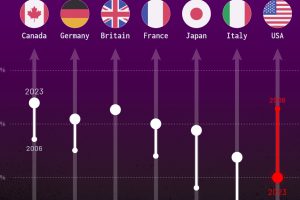How America’s Major Crop Farmlands Compare to Entire Countries
This was originally posted on our Voronoi app. Download the app for free on iOS or Android and discover incredible data-driven charts from a variety of trusted sources.
In 2023, the U.S. harvested 500 million metric tons of corn—a volume so immense it would fill over 1,000 of the world’s largest cargo ships, each with a 400,000 metric ton capacity.
Naturally, this enormous amount of corn, along with other major crops, requires a vast amount of land. In this graphic, we compare the size of farmlands needed for growing corn, soybeans, hay, and wheat to similarly-sized countries around the world.
Data for visualization was sourced from the U.S. Department of Agriculture and the World Bank.
How Much Land is Required to Grow America’s Big Four Crops?
The U.S. devoted more than the entire area of Malaysia (127,000 miles² or 329,000 km²) to growing corn in 2023. Corn is a key caloric ingredient in animal feed, as well as for creating high fructose corn syrup, used as a sweetener in many processed foods and beverages.
| Crop | Area Harvested | Equivalent Country | Land Area |
|---|---|---|---|
| Corn | 145,000 mi² | 🇲🇾 Malaysia | 127,000 mi² |
| Soybean | 129,000 mi² | 🇫🇮 Finland | 117,000 mi² |
| Hay | 83,000 mi² | 🇸🇾 Syria | 71,000 mi² |
| Wheat | 58,000 mi² | 🇳🇵 Nepal | 55,000 mi² |
Note: Figures rounded.
Meanwhile, America’s soybean crop could cover all of Finland, an area measuring 117,000 mi² or 304,000 km².
Like corn, soybean is also primarily for animal feed. Other uses include vegetable oil production and biodiesel, and for export to countries like China.
Together, just both these crops (274,000 mi² or 710,000 km²) could replace Myanmar, the 40th largest country in the world.
Unsurprisingly, the third most harvested crop, hay, is also for animals, particularly for the dairy and beef industries, which rely on a steady supply of high-quality forage. Hay croplands could blanket all of Syria (71,000 mi²).
And finally the farmland required to grow America’s staple grain, wheat, could replace Nepal (55,000 mi²). The U.S. is the fourth-largest wheat producer in the world, accounting for 45 million metric tons in 2023.
Learn More on the Voronoi App 
The U.S. produces about four times the amount of corn per acre of land compared to soybean and wheat. But this wasn’t always the case. Check out A Century of Growing Corn Yields to see how the country went all in on corn.





